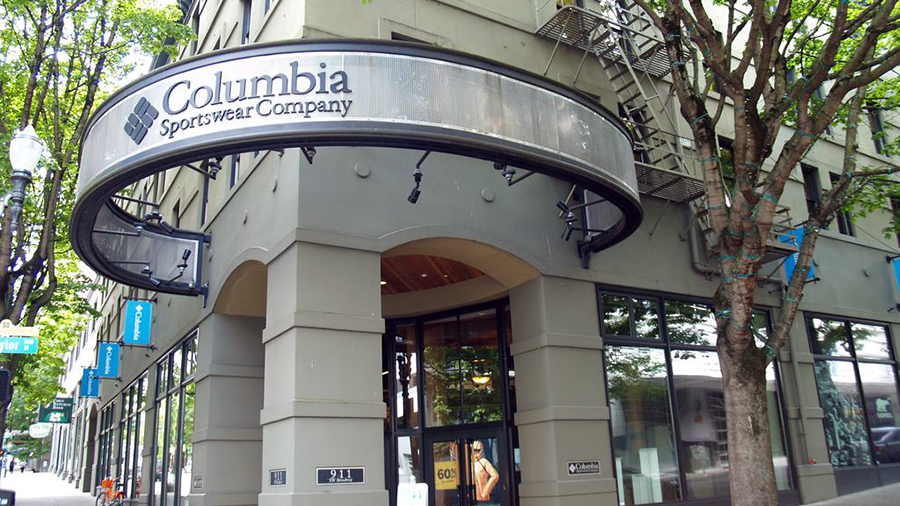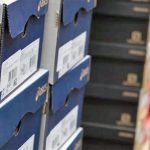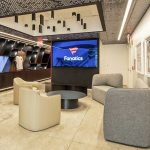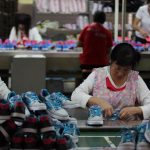Columbia Sports reported consolidated net sales increased 3 percent (+3 percent constant-currency) to $985.7 million from $955.0 million in the comparable period in 2022. Net sales growth was balanced across the DTC and wholesale businesses. Within wholesale, growth was reportedly driven by earlier shipments of Fall 2023 orders compared to the same period last year, which more than offset lower distributor sales.
Wholesale sales were up 3 percent in the third quarter, and DTC was up 4 percent. DTC was 32.6 percent of sales in the third quarter.
Within wholesale, the approximate impact of timing shifts reportedly resulted in a $30 million benefit to net sales when compared to the third quarter of last year; this was to be “relatively in line” with company expectations heading into the quarter.
“Third quarter performance was led by international-direct markets, with Canada, Europe-direct and China all delivering over 20 percent year-over-year growth in constant currency,” commented company Chairman, President and CEO Tim Boyle. “In the U.S., the marketplace remains challenging, but we are making meaningful progress on our inventory reduction plan, with inventory exiting the quarter down 16 percent year-over-year. As we enter our peak selling season, we have numerous activations across our brand portfolio to engage consumers and drive sales, including product collaborations, pop-up shops and continued momentum in Columbia’s Omni-Heat Infinity collection.”
U.S. sales were up 5 percent for the three-month period ended September 30 to $635.4 million. U.S. wholesale increased in mid-single-digits, largely driven by on-time Fall 2023 shipments relative to late deliveries last year. U.S. DTC net sales increased in the low single-digits. Brick-and-mortar was said to be up in mid-single digits, driven by the contribution from new stores opened over the last year and incremental sales from temporary outlet stores. U.S. e-commerce net sales were down in the high single-digits.
Boyle said the online environment remains “competitive and promotional.”
Canada sales were up 33 percent in reported terms to $105.5 million in Q3, or up 38 percent in constant-currency terms for the quarter, driven by earlier shipment of Fall 2023 orders and strong DTC brick-and-mortar performance.
Latin America and Asia Pacific (LAAP) region sales were flat at $115.4 million for the quarter in reported terms but grew 4 percent in constant-currency (cc) terms for the quarter.
China’s net sales reportedly increased in the mid-20s, reflecting strong consumer demand across all channels.”Our team in China has done an excellent job of driving engagement with consumers in new ways that are authentic to Columbia,” offered Boyle. “In October, we built an entire Columbia brand nature exploration experience at Shanghai’s Grand Gateway Mall. The installation featured four specific sectors: beach, cloud, glacier, and jungle. Within each of these microclimates, consumers were able to learn about Columbia’s warmth, dry, cool, and protected innovations and experienced them in action.”
Boyle offered several examples of how the company is investing in marketing efforts in China, and said he believes the investments they’ve made in China to elevate talent and drive operational improvements are yielding results.
“China is expected to be one of our fastest growing markets this year, and we’re well positioned looking into the future,” he said.
Japan’s net sales reportedly increased in the low teens in Q3, aided by earlier shipments of Fall ’23 orders and DTC growth.
Korea net sales declined in the low 30s, and the company continues to reset the business for “long-term growth in challenging market conditions.”
“As we outlined on the last call, management is focused on several multi-year initiatives across talent, distribution, marketing and product,” Boyle explained. “This process includes closing unprofitable doors and non-brand enhancing wholesale accounts as we work to elevate distribution. We believe these efforts will drive a deeper connection with consumers and fuel sustainable growth.”
The LAAP distributor markets were down in the mid-teens in the quarter, reflecting on-time Fall 2023 orders, which shifted the timing of sales into the second quarter.
Europe, Middle East, and Africa (EMEA) region sales were down 16 percent to $129.4 million in reported terms and down 21 percent in constant-currency terms for the quarter.
Europe direct net sales increased 20 percent, benefiting from earlier shipment of Fall ’23 product and robust DTC growth. Direct-to-consumer performance was said to be driven by the addition of seven new brick-and-mortar doors over the past year and strong e-commerce performance.
“As part of our strategy to elevate the Columbia brand experience at retail, we’ve opened ten new shop-in-shops with Intersport in France and Germany this year,” Boyle shared. “These enhanced in-store displays secure space for the brand at an important strategic retail partner while elevating the assortment presentation.”
He went on to say that Europe Direct had been one of the top-performing markets throughout 2023.
“Despite the positive momentum we’re seeing, we anticipate external headwinds will be more impactful to growth in the quarters ahead,” he added.
The EMEA distributor business reportedly declined high 80 percent, reflecting the anniversary of shipments to Russia, as well as a greater portion of Fall 2023 orders shipping in the second quarter.
From a brand standpoint, Columbia brand sales grew 4 percent in Q3 to $804.0 million in Q3, including the benefit of earlier Fall ’23 shipments.
Sorel sales increased 9 percent (+8 percent cc) to $122.1 million, primarily driven by earlier Fall 2023 shipments and higher wholesale closeout sales. Boyle said the brand recently opened 20 shop-in-shops at Nordstrom to celebrate 50 years of the iconic Caribou Boot and the launch of the new Caribou X collection. Early season sell-through at these shop-in-shops has been “very encouraging,” according to Boyle’s comments.
Prana sales declined 18 percent to $30.7 million in the quarter. Boyle said the Prana team remains focused on re-positioning the brand for growth in future seasons, with new Brand President Tricia Shumavon “quickly assessing promise opportunities and charting a path to unlock the brand’s growth potential.”
Mountain Headwear sales declined 9 percent (-8 percent cc) to $28.9 million during the period, driven by Fall 2023 wholesale shipments partially offset by DTC growth. Boyle said Mountain Hardwear’s collaboration with the Stussy brand featured several co-branded products, including jackets, trousers and beanies, as well as sleeping bags. The collection reportedly “quickly sold out and immediately boosted traffic to Mountain Hardwear’s website.”
Consolidated gross margin expanded 70 basis points to 48.7 percent of net sales in Q3. Gross margin expansion was said to primarily reflect lower inbound freight costs and favorable channel mix, which more than offset the impact of inventory reduction efforts across COLM’s wholesale and DTC businesses.
Company SG&A expenses increased 10 percent to $351.6 million, or 35.7 percent of net sales, in Q3, compared to $319.0 million, or 33.4 percent of net sales, for Q3 2022. SG&A expense growth was reported as primarily reflecting higher expenses across DTC, demand creation, and supply chain.
Consolidated operating income decreased 7 percent to $134.6 million, or 13.7 percent of net sales, in the third quarter, compared to $145.3 million, or 15.2 percent of net sales, in the comp 2022 quarter.
Interest income for Q3, net of $1.9 million, compared to net interest income of $0.8 million for the comparable period in 2022, reflects higher yields on increased cash, cash equivalents and investments.
Income tax expense of $32.6 million resulted in an effective income tax rate of 24.0 percent, compared to income tax expense of $34.0 million, or an effective income tax rate of 23.3 percent, for the comparable period in 2022.
Company net income decreased 7 percent to $103.5 million, or $1.70 per diluted share, in the third quarter, compared to net income of $111.8 million, or $1.80 per diluted share, for the third quarter in 2022.
On the balance sheet, Columbia Sportswear had cash, cash equivalents and short-term investments totaling $214.8 million at quarter-end, compared to $160.2 million as of September 30, 2022.
The company had no borrowings as of September 30, compared to borrowings of $4.4 million as of September 30, 2022.
Inventories decreased 16 percent to $885.2 million at quarter-end, compared to $1.06 billion as of September 30, 2022. The decrease was driven by a reduction in current season and carryover inventory resulting from lower inventory purchases and earlier receipt and shipment of Fall 2023 product.
“I’m pleased to report the inventory exiting the quarter was down 16 percent year-over-year,” Boyle said, highlighting one bright spot. “Throughout the year, we’ve been executing our inventory reduction plan. The combination of lower inventory buys, shipment of Fall ’23 orders, and increased excess inventory sales in our outlet stores has yielded substantial progress toward our goal. We’ve done this while generating healthy gross margins, which is a testament to the evergreen nature of our products. We have a clear path to achieving our goal of reducing year-end inventory by over $200 million compared to last year.”
Boyle said they are lowering the company’s outlook based on the third-quarter performance and a more cautious forecast for the remainder of the year.
“Despite this net sales reduction, our diluted earnings per share range is moving slightly higher, reflecting a relatively unchanged margin outlook and a lower effective tax rate,” Boyle said.
For the fourth quarter, net sales are expected to be $1.05 billion to $1.11 billion, representing a decline of 10 percent to 5 percent from $1.17 billion delivered in the comparable Q4 period in 2022. Boyle said this reflects the wholesale sales shift into the third quarter compared to last year, partially offset by modest DTC growth.
Operating income is expected to be $146 to $166 million in Q4, resulting in operating margins of 13.8 percent to 15.0 percent, compared to an operating margin of 13.3 percent in the comparable Q4 period in 2022. Diluted earnings per share are expected to be $1.93 to $2.18 a share, compared to $2.02 for the comparable period in 2022.
“Our fourth quarter net sales outlook incorporates a slow start to the fall selling season we have experienced and a more cautious view on sales trends for the balance of the year,” Boyle explained.
For the 2023 full year, net sales are now expected to increase 0.5 percent to 2.0 percent, down from the previous range of 2.0 percent to 3.5 percent growth, resulting in net sales of $3.48 billion to $3.53 billion from prior guidance of $3.53 billion to $3.59 billion, and compared to $3.46 billion in 2022.
Gross margin is expected to expand approximately 40 basis points, which is unchanged, to approximately 49.8 percent of net sales from 49.4 percent of net sales in 2022. SG&A expenses, as a percent of net sales, are expected to be in the range of 40.2 percent to 40.6 percent versus a previous range of 40.1 percent to 40.5 percent, and compared to SG&A expenses as a percent of net sales of 37.7 percent in 2022. Operating income is expected to be in the $343 million to $363 million range, down from the previous guidance of $348 million to $368 million, resulting in an operating margin of 9.8 to 10.3 percent, compared to an operating margin of 11.3 percent in 2022.
Full-year net income is now expected to range between $275 and $290 million for the year, up from prior guidance of $272 million to $288 million, resulting in diluted earnings per share of $4.45 to $4.70 versus prior guidance of $4.40 to $4.65 a share.
“We anticipate strong operating cash flow of approximately $500 million in 2023 as our inventory levels normalize,” Boyle said.
“Spring 2024 will be a challenging season for our business,” the company wrote to close out its third-quarter press release. “The combination of consumer and category headwinds, retailer cautiousness, and our transition to product designed without perfluoroalkyl and polyfluoroalkyl substances (PFAS) will impact the first half of the year.”
The company said the Spring 2024 order book reflected these challenges and, as a result, it is forecasting a low-double-digit percent decline in wholesale net sales in the first half of 2024. The company added that it expects the wholesale net sales decline will be partially offset by continued growth in the global DTC businesses, resulting in total net sales declining a mid-single-digit percent in the first half of 2024.
“We believe that generating full-year net sales growth with modest operating margin expansion is achievable. Generating full-year 2024 sales growth will be dependent upon several factors including, but not limited to, retailer and consumer sentiment, economic conditions, geopolitical tensions, and our transition to product designed without PFAS,” the company said in its statement.
Boyle suggested that generating net sales growth in 2024 is achievable as retail inventory levels normalize and retailers seek to restock products designed with PFAS-free chemistry.
Photo courtesy Columbia Sportswear Company
















